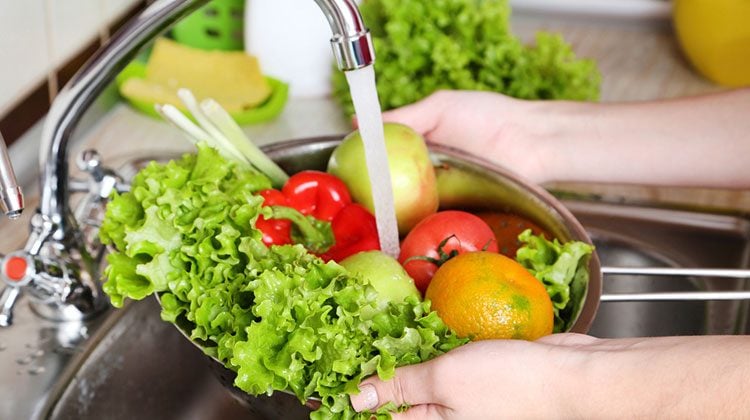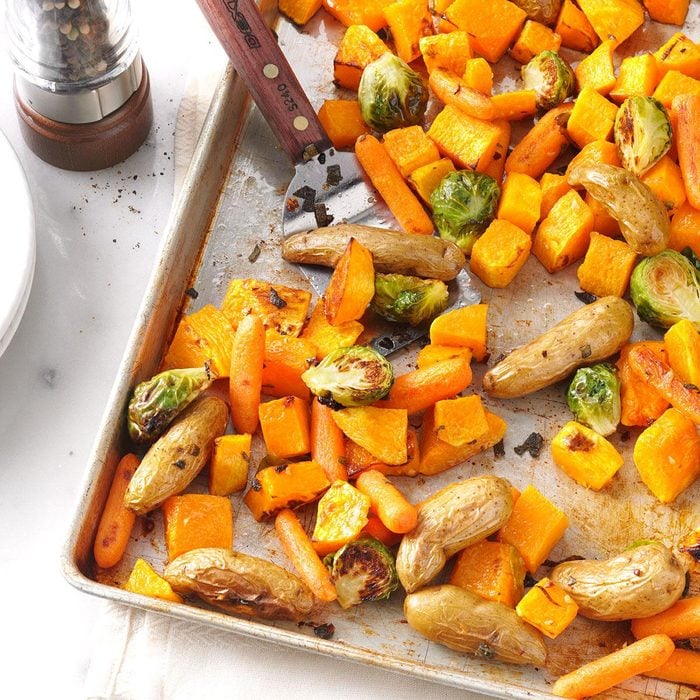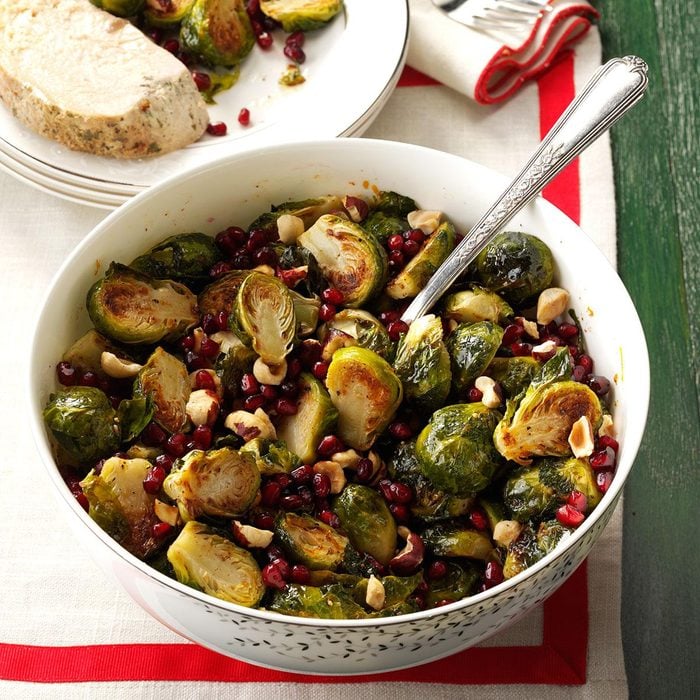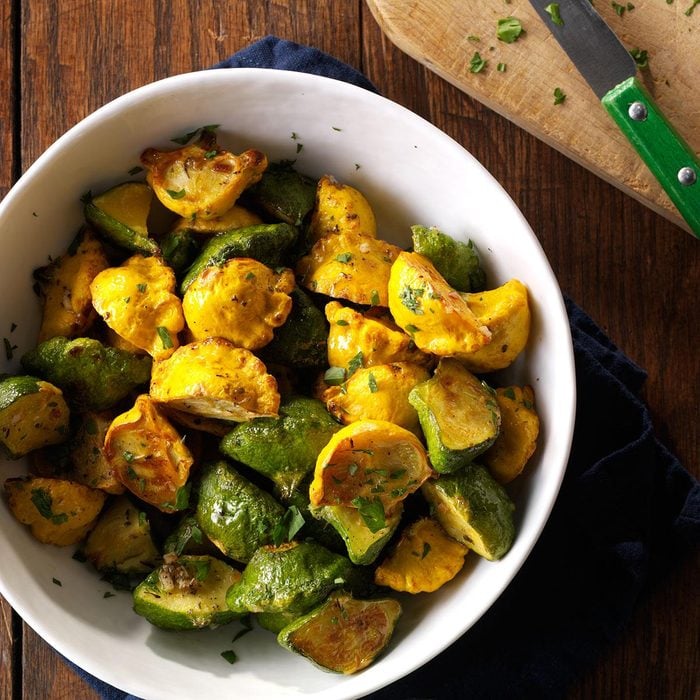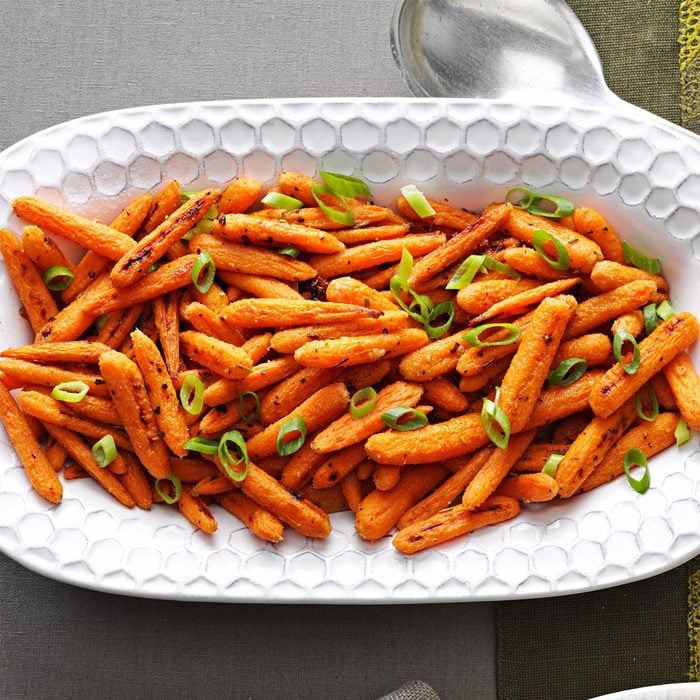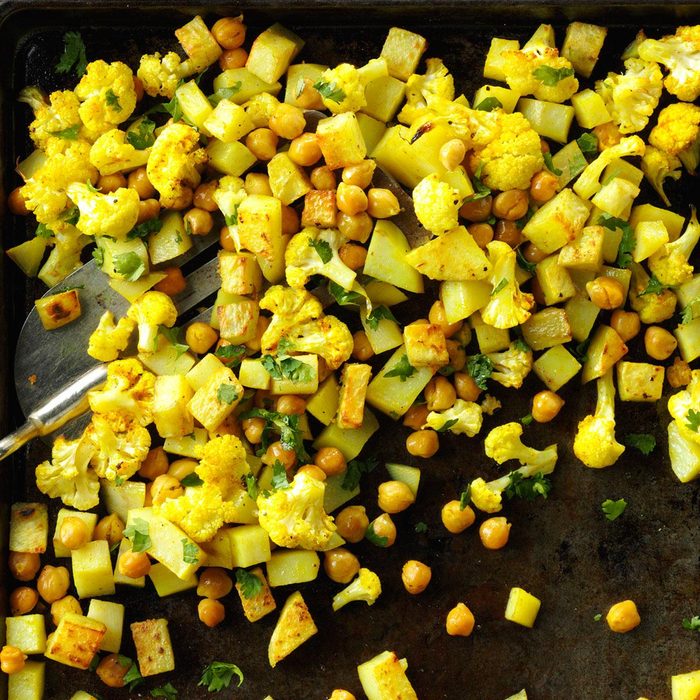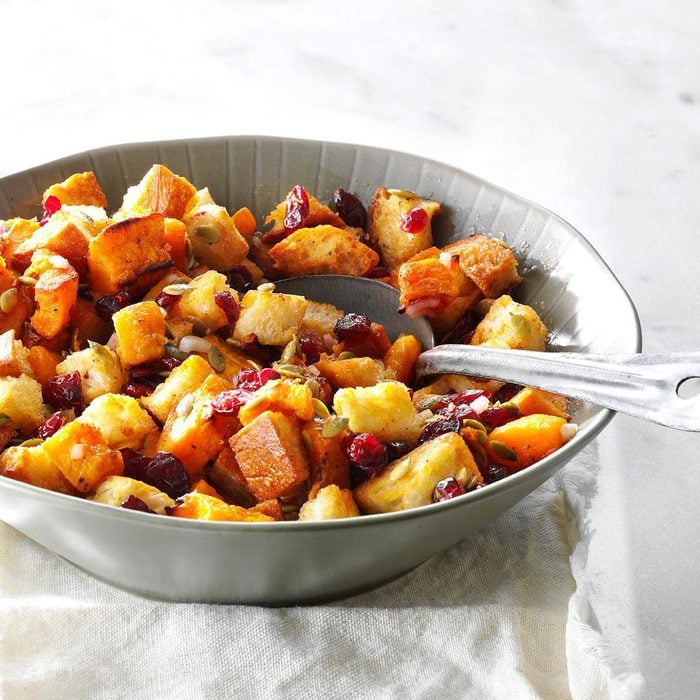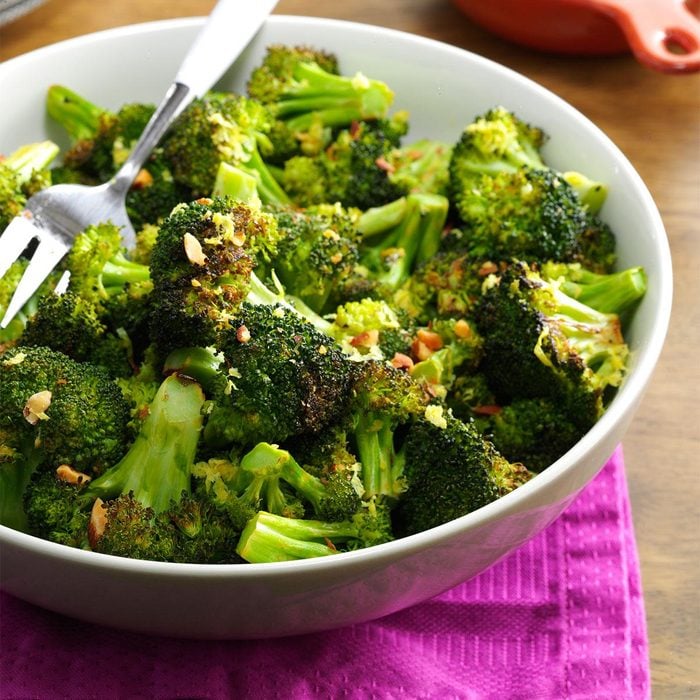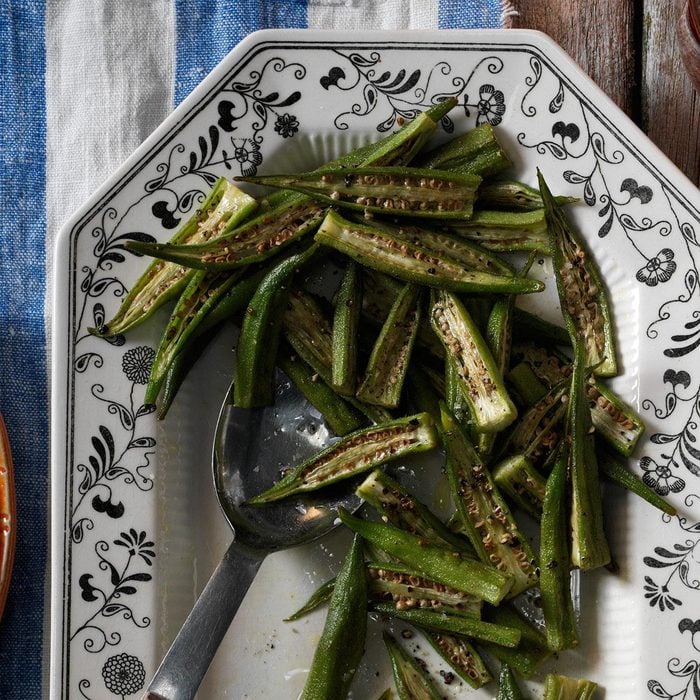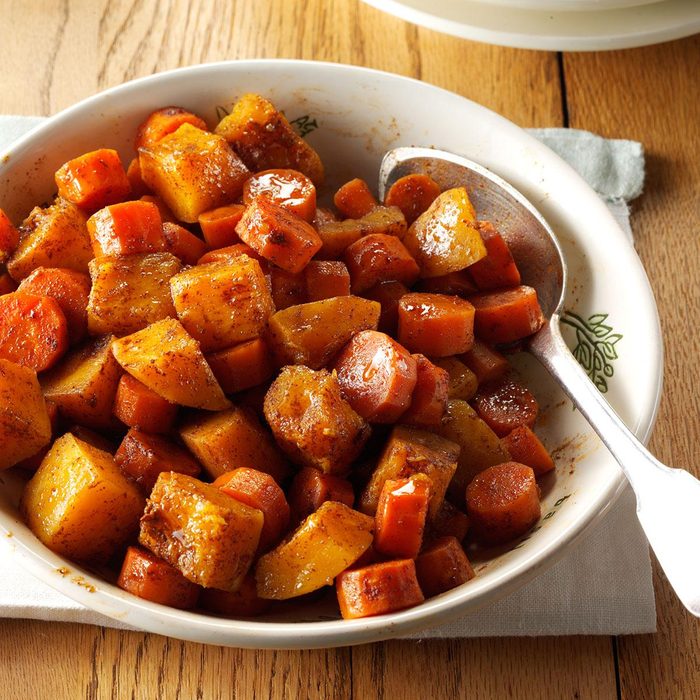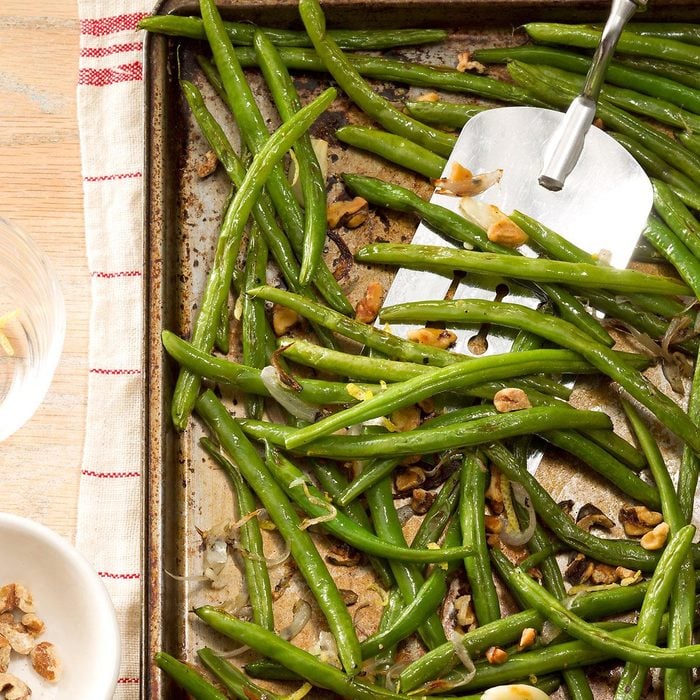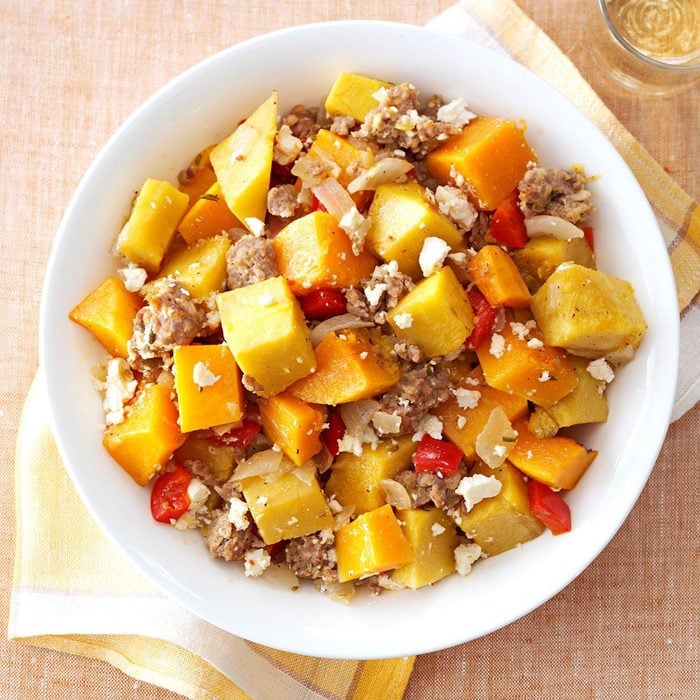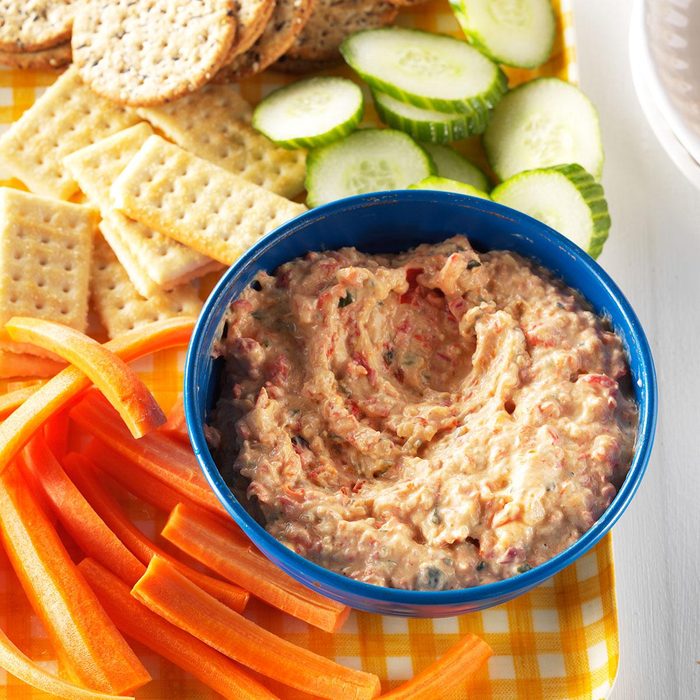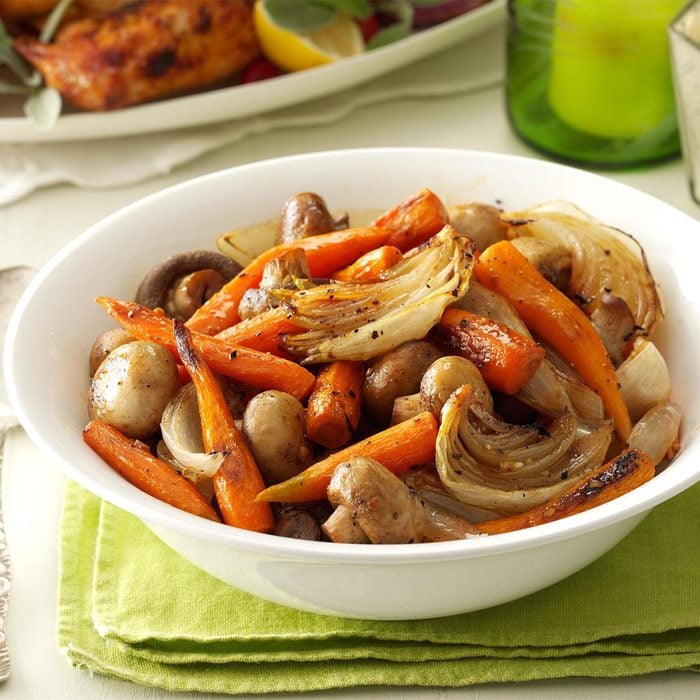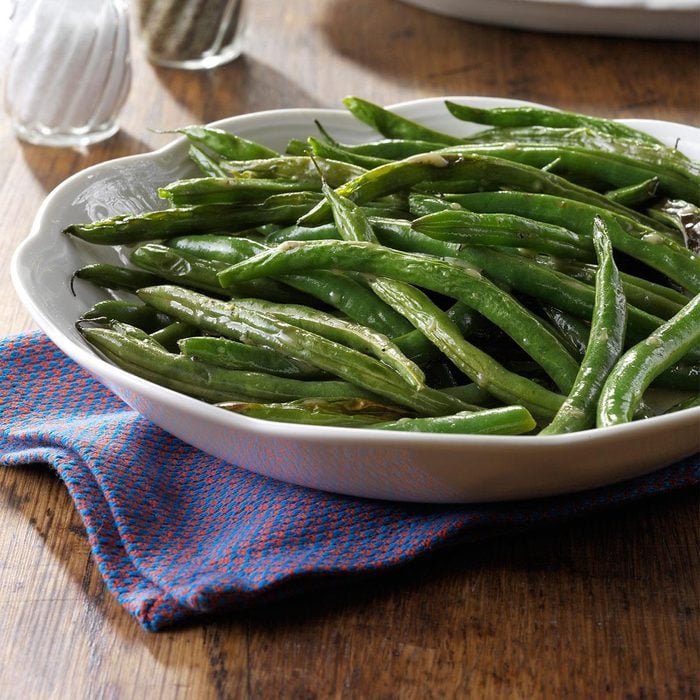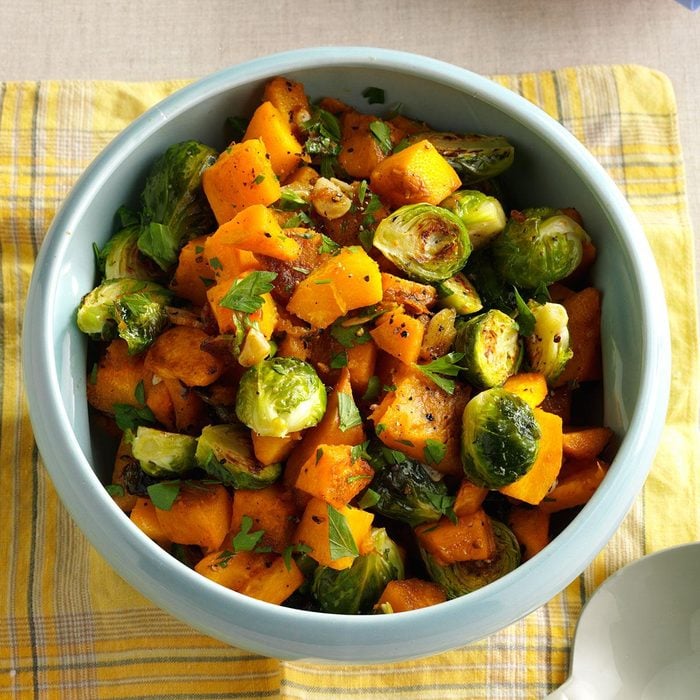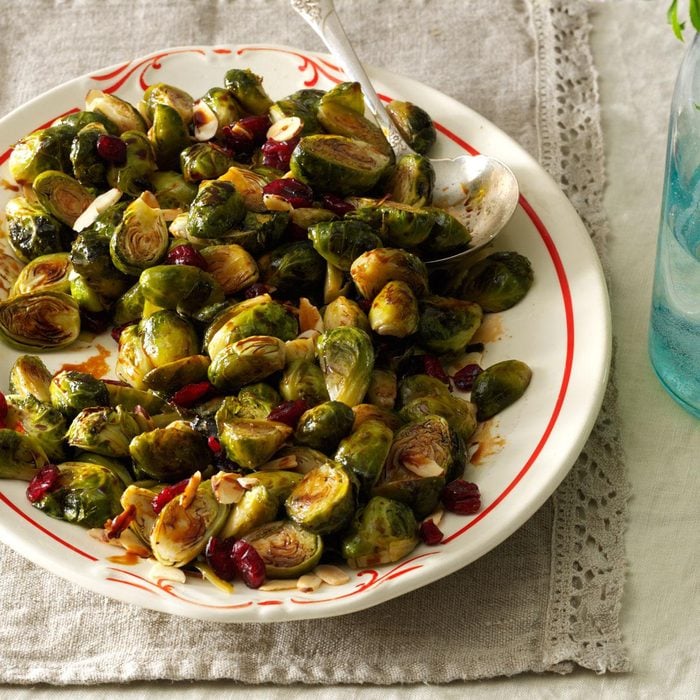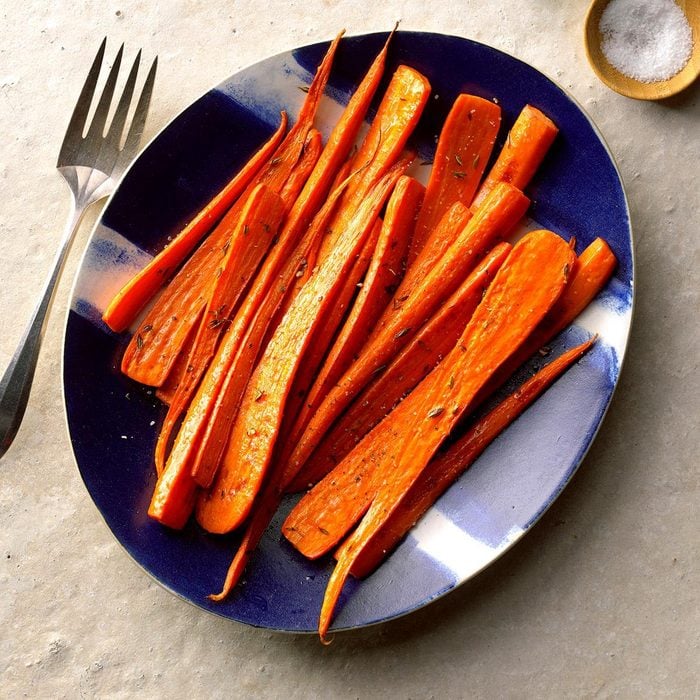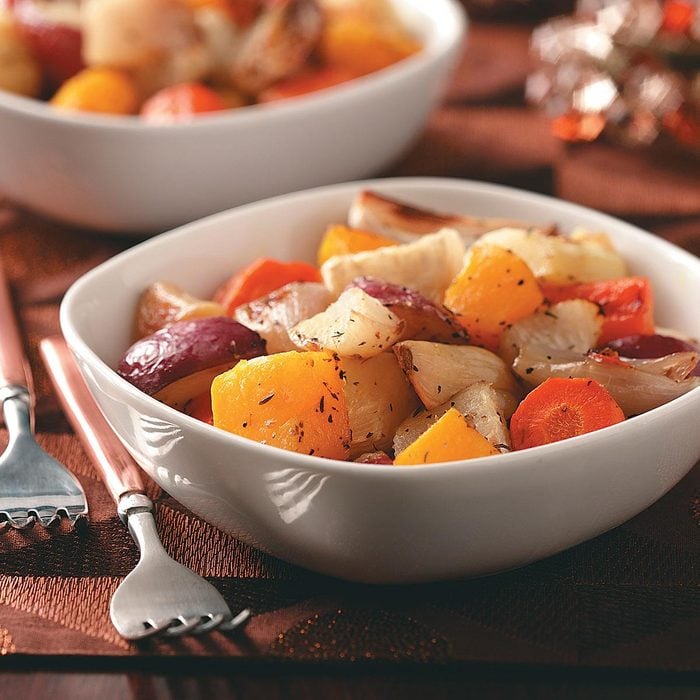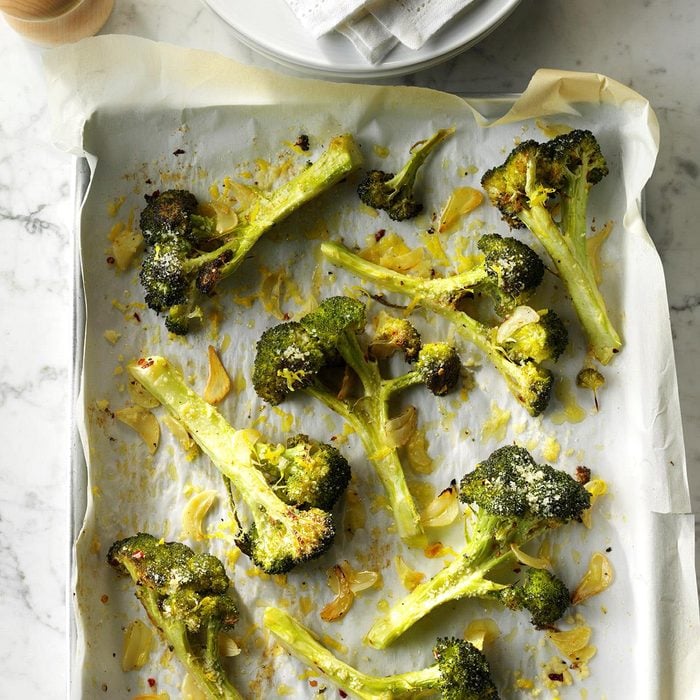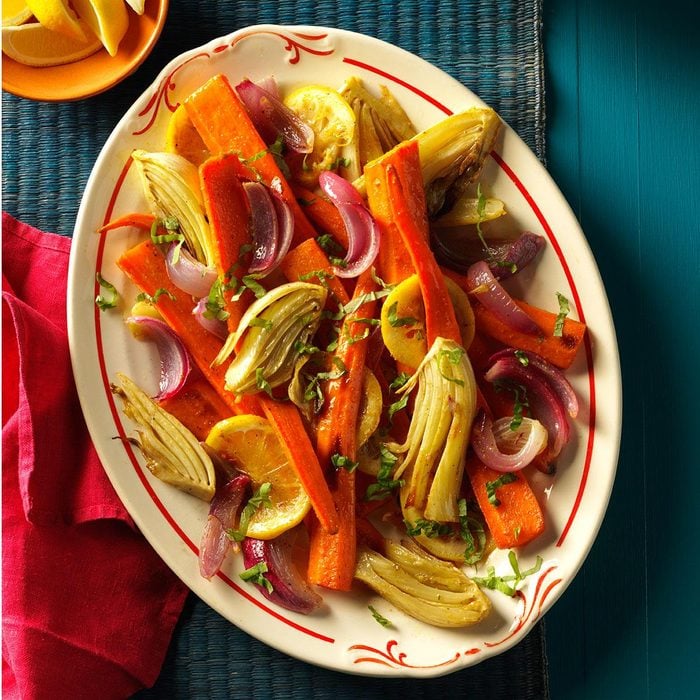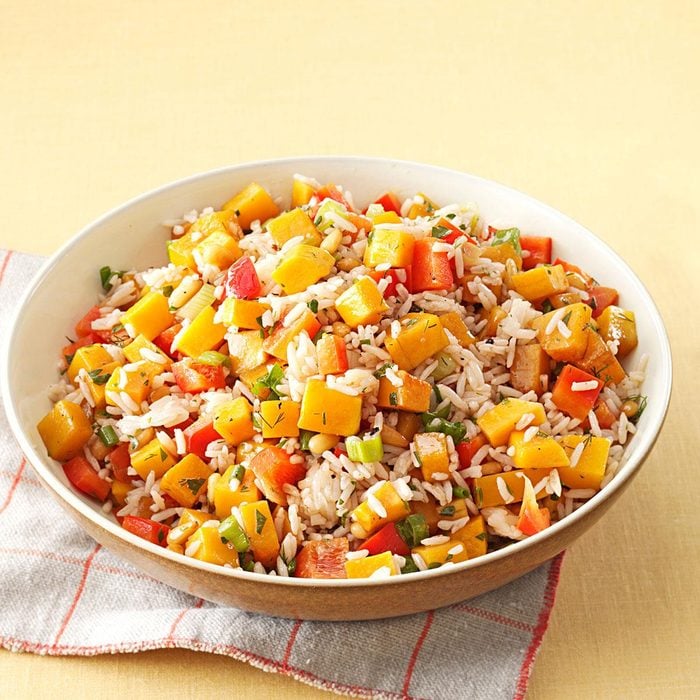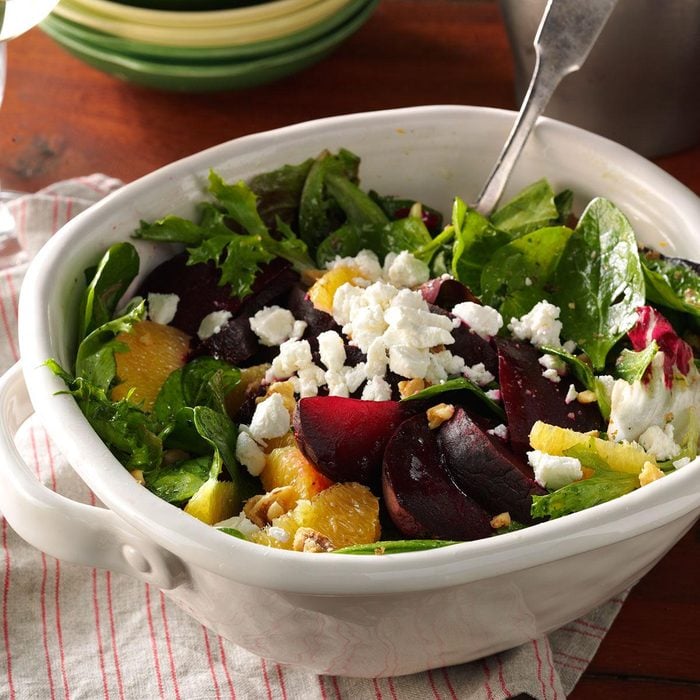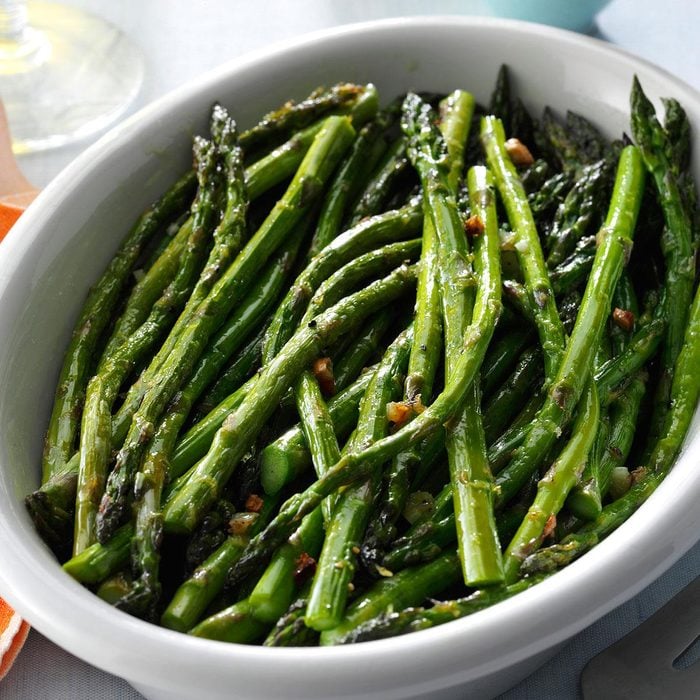Oven-Roasted AsparagusAsparagus never tasted so good! Simply seasoned with butter and green onions, they taste fresh and keep their bright green color, too. They're so good, you might want to make extra. This is how to cook asparagus in the oven. —Jody Fisher, Stewartstown, Pennsylvania
Cumin-Roasted CarrotsCarrots make a super side—they are big on flavor and a breeze to cook. Plus, I can actually get my husband to eat these spiced veggies. —Taylor Kiser, Brandon, Florida
Roasted Vegetables with SageWhen I can't decide what vegetable to serve at dinner, I turn to this oven-roasted medley that features brussels sprouts, potatoes, carrots and butternut squash. It pleases everyone around the table.—Betty Fulks, Onia, Arkansas
Smoky CauliflowerThe smoked Spanish paprika gives a simple side of roasted cauliflower extra depth. This is definitely a favorite. —Juliette Mulholland, Corvallis, Oregon
Pomegranate-Hazelnut Roasted Brussels SproutsI converted many people to Brussels sprouts with this recipe, and it has since become my most requested dish. The richness of the hazelnuts and the sweetness of pomegranate and orange elevate the sprouts to a new level. —Melanie Stevenson, Reading, Pennsylvania
Roasted Cabbage & OnionsI roast veggies to bring out their sweetness, and it works wonders with onions and cabbage. The piquant vinegar-mustard sauce makes this dish similar to a slaw. —Ann Sheehy, Lawrence, Massachusetts
Garlic-Herb Pattypan SquashThe first time I grew a garden, I harvested summer squash and cooked it with garlic and herbs. Using pattypan squash is a creative twist. —Kaycee Mason, Siloam Springs, Arkansas
Rosemary Roasted Baby CarrotsBaby carrots go over big when seasoned with the subtle taste of rosemary. I like to sprinkle raisins on top for a combination of sweet and savory. —Aysha Schurman, Ammon, Idaho
Roasted Curried Chickpeas and CauliflowerWhen there’s not much time to cook, try roasting potatoes and cauliflower with chickpeas for a warm-you-up dinner. It's a filling meal on its own, but you can add chicken or tofu to the sheet pan if you'd like. —Pam Correll, Brockport, Pennsylvania
Roasted Butternut Squash PanzanellaSquash was a hard sell with my family until I paired it with pumpkin seeds, cranberries and horseradish. Now they love it! —Devon Delaney, Westport, Connecticut
Lemon Pepper Roasted BroccoliFresh green broccoli turns tangy and tasty when roasted with lemon juice and pepper. A sprinkle of almonds adds crunch. —Liz Bellville, Jacksonville, North Carolina
Browned Butter Roasted CauliflowerWhen I was growing up, my mother (who insists on loving some of the least popular vegetables) always raved about how deliciously sweet and tender cauliflower can be. Here, the briny capers, lemon juice and sweet raisins allow the caramelized, nutty cauliflower to shine. —Gina Myers, Spokane, Washington
Roasted OkraOur recipe for roasted okra transforms this versatile vegetable into a crispy, flavorful treat. Perfect as a side dish or snack, roasted okra is a healthy way to enjoy this often under-appreciated veggie.
Spiced Carrots & Butternut SquashWhen I've got a lot going on, my slow cooker is my go-to tool for cooking veggies. The sweetness of the squash and carrots really complements the spicy seasonings. —Courtney Stultz, Weir, Kansas
Roasted Squash, Carrots & WalnutsAfter the turkey’s done, I dial up the oven temp and roast carrots and squash for this yummy side. That frees me up to start the gravy. —Lily Julow, Lawrenceville, Georgia
Roasted Acorn Squash & Brussels SproutsI love creating dishes with few ingredients and easy steps, like squash with Brussels sprouts. Maple syrup adds a slight sweetness, and pecans give it a toasty crunch. —Angela LeMoine, Howell, New Jersey
Roasted Green Beans with Lemon & WalnutsI first tasted roasted green beans in a Chinese restaurant and fell in love with the texture and flavor. This is my Americanized version and it's always a big hit at our holiday table. —Lily Julow, Lawrenceville, Georgia
Winter Squash, Sausage & Feta BakeThis time of year, I can't resist butternut squash, with its bright color and fall flavor. It helps make this casserole a guaranteed hit at potlucks. —Craig Simpson, Savannah, Georgia
Garlic-Roasted Brussels Sprouts with Mustard SauceDon’t be afraid to bring out the roasted Brussels sprouts. Mellowed with mustard sauce, they may just delight even the most skeptical folks. —Becky Walch, Orland, California
Roasted Vegetable DipWhile my children were always very willing eaters, I came up with this recipe to get them to eat more veggies and enjoy it. The dip doesn't last long in our house. —Sarah Vasques, Milford, New Hampshire
Savory Roasted Carrots with MushroomsYou’ll need only 10 minutes to get these savory veggies ready for the oven. Then just stir them a few times during roasting, and you’re done. It’s a busy cook’s dream!—Pam Corder, Monroe, Louisiana
Lemon Roasted Fingerlings and Brussels SproutsMy trick to roasting veggies is to choose ones that cook in the same amount of time. Other combinations to try? Cauliflower florets with baby carrots or okra with cherry tomatoes. —Courtney Gaylord, Columbus, Indiana
Roasted Cauliflower & Brussels Sprouts with BaconThis deeply delicious recipe is a surefire way to get my husband to enjoy Brussels sprouts. Between the roasted flavor of the veggies and smoky, crisp bacon, it will convert even the pickiest eater. —Lisa Speer, Palm Beach, Florida
Roasted Green Bean SaladThis easy recipe turns homegrown green beans into something special. A tangy dill and Dijon vinaigrette coats the beans without overpowering them so the fresh-picked flavor comes through. —Kathy Shell, San Diego, California
Oven-Roasted Spiced CarrotsI started roasting veggies and serving them often with dinner. Now my children say, “Is it OK to finish the veggies?” Pinch me. —Joan Duckworth, Lee's Summit, Missouri
Roasted Pumpkin and Brussels SproutsWhile traveling to Taiwan, I had the pleasure of trying a unique vegetable dish that included fresh pumpkin. It inspired me to roast pumpkin with Brussels sprouts. —Pam Correll, Brockport, Pennsylvania
Roasted Herb & Lemon CauliflowerA standout cauliflower side is easy to prepare with just a few ingredients. Crushed red pepper flakes add a touch of heat. —Susan Hein, Burlington, Wisconsin
Roasted Brussels Sprouts with Cranberries & AlmondsIf Brussels sprouts taste bitter to you, roast them for a gentle sweetness that goes with cranberries and almonds. This side dish won us over. —Claudia Lamascolo, Melbourne, Florida
Roasted Carrots with ThymeThese roasted carrots are so simple but always a hit. Cutting the carrots lengthwise makes this dish look extra pretty.—Deirdre Cox, Kansas City, Missouri
Garlic Roasted Winter VegetablesThese colorful vegetables boasting a subtle herb flavor roast to perfection and are guaranteed to become a holiday favorite. They complement almost any entrée and are easy to prepare. —Donna Lamano, Olathe, Kansas
Roasted Red Pepper TapenadeWhen entertaining, I often rely on my pepper tapenade recipe because it takes only 15 minutes to whip up and pop in the fridge. Sometimes I swap out the almonds for walnuts or pecans. —Donna Magliaro, Denville, New Jersey
Parmesan Roasted BroccoliSure, it’s simple and healthy but, oh, this roasted broccoli is also delicious. Cutting the stalks into tall trees turns the ordinary veggie into a standout side dish. —Holly Sander, Lake Mary, Florida
Roasted Carrots & FennelThis addictive fennel recipe is a fresh take on one of my mother's standard wintertime dishes. I usually add more carrots—as many as the pans will hold. —Lily Julow, Lawrenceville, Georgia
Roasted Butternut Squash & Rice SaladWe have end-of-season picnics for my son's flag football team. This makes enough to serve plenty of hungry boys and their families. — Dolores Deifel, Mundelein, Illinois
Roasted Beet Salad with Orange VinaigretteBeets, oranges and spinach sprinkled with goat cheese make a scrumptious new blend for a mixed green salad. The combination may seem unlikely, but I guarantee it will become a favorite. —Nancy Heishman, Las Vegas, Nevada
Lemon-Roasted AsparagusWhen it comes to fixing asparagus, I think it's hard to go wrong. The springy flavors in this easy lemon asparagus recipe burst with every bite. —Jenn Tidwell, Fair Oaks, California
Roasted Red Pepper BreadThese savory loaves are moist, tender and loaded with flavor from grated Parmesan cheese and roasted sweet red peppers. They're fantastic at dinner or as an appetizer. —Cheryl Perry, Hertford, North Carolina
